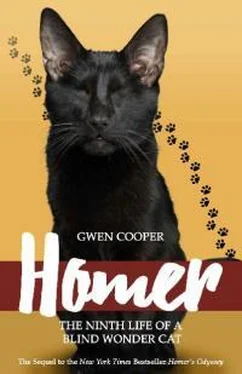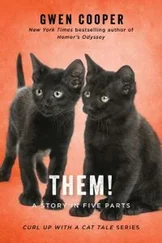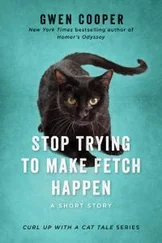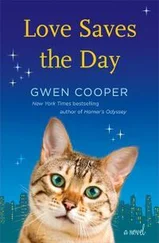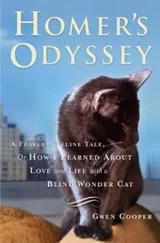“He knows what he knows. Maybe that’s enough,” Jackson concluded. “And Homer might end up surprising you. Cats usually do.”
JACKSON’S WORDS PROVED to be prophetic. Days became weeks became months, and still Homer was with us. Still the same Homer more or less, although he did eventually slow a bit, like a clock just beginning to wind down.
The worst thing a cat can do for his liver is to stop eating—but, paradoxically, cats with liver disease are usually reluctant eaters at best. The challenge is to keep them eating, at least enough to give their liver something to do other than eat itself.
Homer, however, had always been a cat who defied expectations, and he ate voraciously. To say that Homer became a non-stop eating machine would be an understatement—and trying to describe what it was like to watch a four-pound cat eat his body weight every day is one of the rare times when words have failed me. It started with the medication the vet had prescribed, which apparently was every bit as yummy as promised when mixed with his regular food. When the two weeks’ worth of medication ran out, I made it my mission to keep the food party going. At first I started out with some kitten-hood favorites, long-since abandoned on health grounds—although my new philosophy was, As long as he’s eating and he’s happy. Kitten Chow once again became a permanent fixture in our cupboard, and Homer attacked it with so much zeal that it almost seemed as if eating the food he’d eaten when he was younger made him feel like a young cat again. Gooey cans of Friskie’s and Fancy Feast also found their way into Homer’s food bowl.
But it was Laurence who really rose to the occasion. What was, for me, a medical imperative became a genuine source of pleasure for Laurence, and finding new and exciting foods to tempt Homer with was his passion. That Homer was eating at all was less surprising than how much he was eating, consuming more than enough food in the typical day to satisfy a grown man.
Laurence brought Homer imported European canned tunas, sliced turkey by the pound, hamburgers, prime rib, shredded roast beef, pork-fried rice, spare ribs, pizza cheese, Gerber’s baby food, and lobster dipped in butter. (The only thing Homer was particular about was his lobster—which was heaven on earth when dipped in butter, but unworthy of his interest when it was not.) He brought home salmon salad and whitefish salad from our favorite bagel place, and a stinky cheese from Murray’s in the West Village that was so very stinky—even when stowed in the refrigerator—we’d had to ditch it a day later, even though the aroma had Homer clawing at the refrigerator door as if his very life depended on getting in.
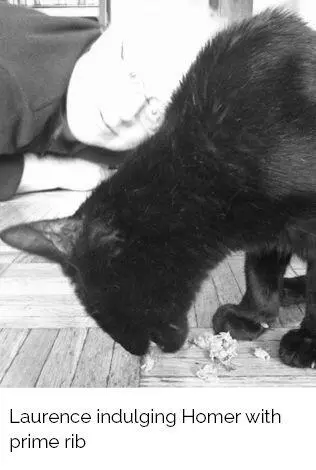
Laurence’s imagination ranged from the high to the low, and he also brought home mysterious “potted meats” found in fifty-cent cans at our local bodega, which Homer gobbled down as enthusiastically as if it were caviar (which Homer also grew to love during that final year). Cans of Vienna Sausages—again from our bodega—mashed with a fork and served au jus were a particular treat. Chinese chicken on the bone from the take-out place across the street was a big hit, although not nearly as tempting as a fried chicken breast from Popeye’s, the smell of which drove Homer absolutely wild with delight. Homer could polish off an entire Popeye’s breast in the space of half an hour, although perhaps Homer’s greatest culinary accomplishment was the time he finished an entire mutton chop—literally bigger than he was!—that Laurence brought home from the legendary Keen’s Steakhouse. (In fairness, I should add that it did take him two days to eat his way through the whole thing.) The image of little Homer, sitting in front of that giant mutton chop like a tiny Henry VIII about to dig into a palace banquet, is one I’ll always be grateful to have in my memory.
Perhaps the only truly perplexing food that Homer developed a taste for was carrot cake. I’d brought home a slice without frosting from a health-food place, saving it as an after-dinner treat for myself. But a couple of hours later I found Homer on the kitchen counter, clawing off the plastic it was wrapped in and gobbling the cake down greedily. I was on the verge of stopping him—carrot cake striking me as an odd and potentially unhealthy choice for a cat. But then I thought, why not? and carried the rest to his bowl, for him to finish at his leisure.
It was clear to us that Homer was waging a tremendous battle, one that required an almost incomprehensible amount of fuel to keep it going. It seems to me now, looking back, that forgoing aggressive medical care turned out to be the right decision, if only because Homer would have fought it, and me, every step of the way. He almost certainly couldn’t have battled on two fronts with nearly as much success as he battled now on just the one.
But even with all his strength—and I’ll admit that I was a bit awed, this late in Homer’s life, to realize fully just how tremendous that strength actually was—the battle was taking its toll. He napped far more than he used to, and lost weight until he was barely more than skin and bones. Running my hand down his back, I could feel every vertebra in his spine. His coat, once so lustrous and sleek, began to look oily. But as long as Homer still played and ate, as long as he still cuddled and purred and chased Fanny and Clayton around, I told myself that I would let him fight for his life on his own terms, without taking anything away from him.
Our bedroom became Homer’s bedroom, and he slept with me every night. Whether because he was confused, or too tired to make the effort of jumping from the bed and walking to his litter-box (which I’d moved permanently into our bedroom), the bed became his nighttime litter-box during those last few months. Honesty compels me to add that those nighttime poops were…something—although who among us hasn’t cleaned up that and worse while caring for an ailing cat? And, given both the size and nature of Homer’s new daily diet, what else could be expected? Laurence moved temporarily into the guest bedroom, and I put a rubber sheet over our mattress. Stripping off all the sheets and blankets, I made a little nest for Homer from some of my old t-shirts and sweaters. As for myself, I slept wrapped up, cocoon-style, in a comforter. Homer and I were still able to cuddle, and it made clean-ups much easier.
I realize that, in the retelling, this sounds like an odd and cumbersome way to live—although it’s amazing how quickly the unusual becomes routine when it’s the landscape of your everyday life. I never thought of it as an imposition at all. I wanted to be there for all this—not just the playtimes and the cuddling, but the late-night cleanings and nursing Homer through bouts of upset stomach and every last messy, inconvenient bit of it. Once upon a time, I had saved Homer’s life. And then, years later, he had saved mine. I can honestly say that I never loved Homer more than any of the other animals I’ve been lucky enough to live with. But Homer and I were bound to each other in a way that was nothing like anything I had experienced before—and I knew that I would never have anything in my life quite like this again. I couldn’t have felt more tied to Homer if he’d literally been flesh of my flesh, bone of my bone.
When spring came, I resumed my schedule of shelter readings and fundraising appearances. Because I worked from home and spent, in the typical day, twenty-one hours or more within ten feet of Homer, it should have been easier to leave him once or twice a month for an afternoon trip upstate or a twenty-four-hour overnight to speak at a shelter farther away. Paradoxically, though, the more time I spent with Homer, the harder it was to go away from him. Still, talking about him at these events was a source of deep, deep pleasure.
Читать дальше
